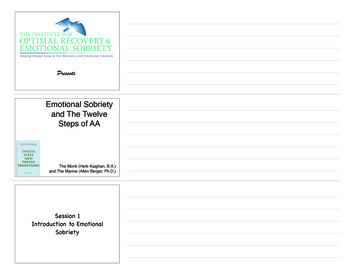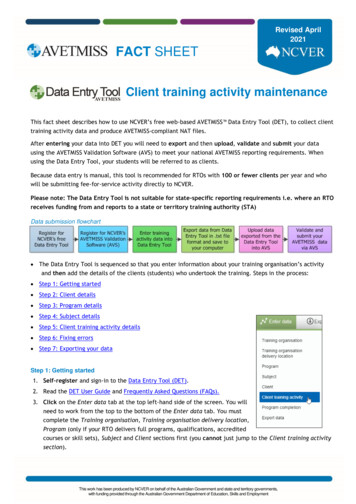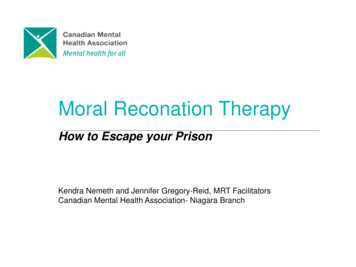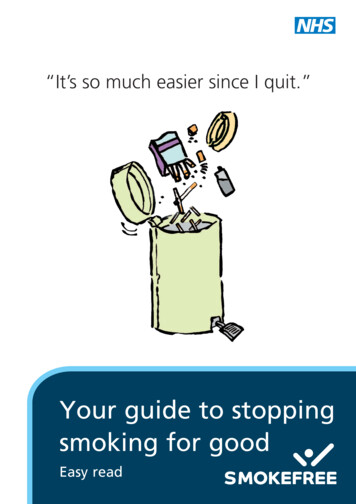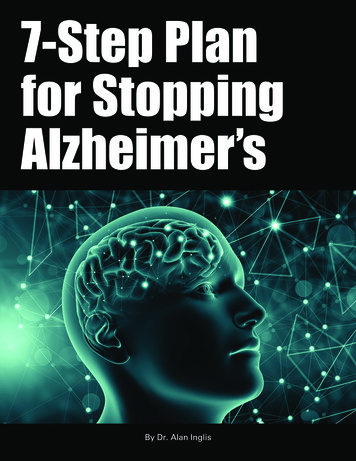
Transcription
7-Step Planfor StoppingAlzheimer’sBy Dr. Alan Inglis
Copyright 2019 by NewMarket Health Publishing, L.L.C., P.O. Box 913. Frederick, MD 21705-0913. All rights reserved. No part of this report maybe reproduced by any means or for any reason without the consent of the publisher. The information contained herein is obtained from sourcesbelieved to be reliable, but its accuracy cannot be guaranteed.Additional orders and inquiries can be directed to Health Revelations, Reader Services Department, P.O. Box 913. Frederick, MD 21705-0913; tel.(443) 353-4206.All material in this publication is provided for information only and may not be construed as medical advice or instruction. No action should betaken based solely on the contents of this publication; instead, readers should consult appropriate health professionals on any matter relating totheir health and well-being. The information and opinions provided in this publication are believed to be accurate and sound, based on the bestjudgment available to the authors, but readers who fail to consult with appropriate health authorities assume the risk of any injuries. The publisheris not responsible for errors or omissions. The material in this report has not been approved by the Food and Drug Administration. The productsdiscussed are not intended to diagnose, treat, cure, or prevent any disease.2
7-Step Plan for STOPPING Alzheimer’sBy Dr. Alan InglisAnd as a bonus, they can boost your overallhealth as well.They’re giving up on you.If you have dementia if you’re at risk for Alzheimer’s disease if you’re even CONCERNEDabout the possibility the mainstream has a message for you.1) Omega-3 fatty acids – There’s been a lot ofdisagreement about omega-3 fatty acids lately, buthere’s the TRUTH There’s NOTHING you can do! omega-3s are ESSENTIAL for brain health.They’re shelving all of their most promisingtreatments and therapies because they keep flunking in clinical trials.I recommend a minimum dosage of 1000 mgtotal EPA and DHA daily.Taking 1000 mg (that’s 3 fish oil capsules of theusual potency) is the amount you need to achieve an8 percent level of omega-3s in the cell membrane.That’s one reason why Bill Gates just namedAlzheimer’s disease one of the biggest public healththreats of the coming decade.It’s also the level where you start to see moodbenefits, according to Andrew Stoll MD, Harvardpsychopharmacologist and pioneer omega-3 researcher.It’s not just that more people will get this andother forms of dementia—although they certainlywill, as cases are expected to TRIPLE by 2050.It’s that there’s practically nothing out there tohelp these folks.A product like Green Pasture’s Blue Ice CodLiver/Butter Oil delivers omega-3s, plus other important fat soluble nutrients—vitamins D, A and K2.Well, there’s nothing out there from the mainstream, anyway.Better yet, eat fatty fish—an excellent source ofomega-3s. Choose from sardines, mackerel, herring or wild caught Pacific Salmon, which shouldbe part of your vegetable-rich whole foods diet.Friend, there are few things more TERRIFYINGthan losing your memory your mind and yourpersonality.Alzheimer’s disease is skyrocketing—a new caseevery 68 seconds.Currently, it affects 1 in 8 Americans over theage of 65—and a whopping 1 in 2 over 85. And it’sthe 6th leading cause of DEATH in this country.And fish isn’t called “brain food” for nothing—it also contains a variety of other compounds thatsupport your brain. Just be sure to choose varietiesthat DON’T contain a lot of mercury, like swordfish, tuna, sea bass, and grouper.If you’re at risk, this might seem like frighteningnews. It can seem hopeless when the mainstreamgives up and walks away, claiming there’s no cureand no treatment.2) Coconut Oil – You could say that the Alzheimer’s brain is brain in a fuel crisis, unable tomake effective use of glucose for energy that’swhy it’s often called Type 3 Diabetes.But I’m not giving up, and I’m not walking away.One good choice is coconut oil, which has beenused in Pacific Rim cultures as a tradition cure forhundreds of years.I’m here to restore hope with 7 safe, natural,proven, and highly effective treatments that can prevent, slow, stop, and in some cases, even REVERSEdementia—WITHOUT dangerous side effects.Coconut oil contains a kind of saturated fatcalled medium chain triglycerides (MCTs). MCTsare converted into ketones, which are easily takenup by brain cells as an alternative energy source.More importantly, they can work if you’re already in the early stages—even if you can alreadyfeel your mind slipping a little more every day.Ketogenic diets have been used for nearly a cen3
was remarkable tury at Johns Hopkins to reduce seizures in children with epilepsy. You can deliver ketones to yourbrain by eating a ketogenic diet—high fat and lowcarb—which causes your body to burn fats for fuel. his personality returned, he was able to onceagain recognize family members and friends, hecould perform basic clerical tasks and manage hisdaily activities.The original ketogenic diet was 80 to 90 percentfat, which is hard to stick to. Less restrictive dietsare modified down to 60-70 percent fat—easierto maintain, but still prompting the synthesis ofketones. Not only that, the side effects of a ketodiet—like an increase in cholesterol or triglycerides—are mild.It’s a pity that the mainstream isn’t interested incoconut oil, even though it’s been shown to deliverbenefits to Alzheimer’s patients. But that’s not surprising because it’s a food—and they can’t makemoney from it—so it threatens the multi-billiondollar “drugs for dementia” industry.Another way to assure an abundant supply ofketones to your brain is to either supplement withmedium chain triglyceride oil (MCT) or coconutoil, which is about 60 percent MCTs—14 grams ofMCTs per tablespoon.Instead, the mainstream continues to push expensive prescription drugs, even though they’vebeen shown to have minimal—or NO—benefit.That foster false hope and if you ask me, it’s abetrayal of patient trust.The recommended dose for TREATING Alzheimer’s is 4-6 tablespoons of coconut oil daily(55 -85 grams, 450-650 calories).3) Dark Chocolate – Here’s another food for Alzheimer’s—and a delicious one, to boot. Yes, darkchocolate can protect against cognitive decline.To PREVENT the disease, take 2-4 tablespoonsdaily (28 grams, 225 - 450 calories). Start low (1-2teaspoons per day) and go slow, increasing by 1teaspoon daily every 3-7 days.Recently, the journal Hypertension reported ona study of chocolate compounds and brain function.It included a summary from GiovambattistaDesired, MD, the study’s lead author and director of the Geriatric Division at Italy’s University ofL’Aquila.And because coconut oil is a high smoke pointcooking oil, you can easily add it to your meals.But that’s not ALL coconut oil can do—not bya long shot.“This study provides encouraging evidence thatconsuming cocoa flavanols, as a part of a caloriecontrolled and nutritionally-balanced diet, couldimprove cognitive function,” he wrote.It also contains lauric acid, which has significant antimicrobial activity—that means it can bothprotect against and treat infection. Mother’s milknaturally contains lauric acid, which is its mainsupport against infection.Coconut oil also stimulates metabolism, and isthought to support a sluggish thyroid. Substitutingcalorie for calorie coconut oil for starchy carbs—bread, cereal, pastas—nearly guarantees weightloss.To gain the benefits of dark chocolate, eat 1 - 11/2 ounces of dark chocolate or a lightly sweetenedcocoa drink daily. You can also combine a cupeach of dark chocolate and coconut oil. Melt themtogether in a pan, then pour into an ice cube holderand freeze. Each cube equals roughly a tablespoonof coconut oil.For more information on coconut oil and dementia, read Alzheimer’s Disease What If ThereWas a Cure? by Mary Newport MD, whose husband developed early onset Alzheimer’s in his 50s.4) Curcumin (turmeric) – Found in curry, thisIndian staple is used to treat dementia and traumatic brain injury. Curcumin may also help prevent and treat AD.Dr. Newport found research by National Institute of Health scientist Dr. Richard Veech and usedits findings to give MCT rich coconut oil to herhusband. He didn’t recover fully, but the differenceA growing body of evidence has found thatoxidative stress, free radicals, Beta amyloid accumulation, heavy metal toxicity (e.g. mercury) andabnormal inflammatory reactions play a role in the4
development of Alzheimer’s.tion and prevent dementia.But curcumin has been shown to decrease betaamyloid plaques, delay nerve cell death, enhancemetal-chelation, reduce inflammation and oxidative stress, and improve memory.Vindure 900 is a high potency resveratrol supplement that’s combined with grape seed extractand quercetin—both of which have extensive research backing their brain and memory protectiveeffects.A major problem with supplemental turmeric isthat it’s not well absorbed, and most of it goes towaste.6) Theanine – An amino acid found in green tea,theanine acts as a gentle calmative, while stimulating dopamine, a neurotransmitter that promotesfocus. With well researched neuroprotective effects, studies also show it slows cognitive decline inseniors. It’s also an effective calmative and supportfor adult attention deficit disorder.However, a Japanese pharmaceutical firm hasdeveloped a water soluble form called Theracurmin that’s 27 times more bioavailable than regularpowder.Theracurmin is currently used for a broad spectrum of clinical trials both in Japan and the U.S.,including impaired glucose tolerance at NationalHospital Organization Kyoto Medical Center, advanced cancer at The University of Texas MD Anderson Cancer Center, and Alzheimer’s preventionat the UCLA Longevity Center.A safe, inexpensive supplement, theanine isavailable as a proprietary Japanese pharmaceutical product called “Suntheanine,” which is sold byvarious companies. The suggested dosage is 200mg taken 2-4 times per day—better on an emptystomach.One capsule daily is a good bet for helping prevent Alzheimer’s. Even better, make curry a regular party of your diet. The much lower rates ofAlzheimer’s in India may be due to regular curryconsumption.7) AHCC (Active Hexose Correlated Compound) – Scientists are looking into a microbeconnection to Alzheimer’s disease—bacterial (chlamydia pneumonia), viruses (herpes simplex virus I),and yeast (candida albicans).5) Resveratrol – Found in red wine and grapes,resveratrol is known for protecting against heartdisease and some cancers. It also helps preventaging by activating certain genes, which mimic calorie restriction.AHCC is a proprietary version of shiitake mushroom that was developed in the 1990s at the University of Tokyo. It’s been found to help protect thebrain against microbes that can cause Alzheimer’sLike theanine, all AHCC is produced by onecompany—in this case, from Amino Up, a Japanesepharmaceutical company. The recommended doseis 1,000mg—3,000mg of AHCC per day.But exciting new research suggests that themechanisms of aging and Alzheimer’s are linked—so resveratrol may protect against nerve degenera-5
7-Step Plan for STOPPING Alzheimer’s By Dr. Alan Inglis They’re giving up on you. If you have dementia if you’re at risk for Al- . Alzheimer’s disease one of the biggest public health threats of the coming decade. It’s not just that more people will get
